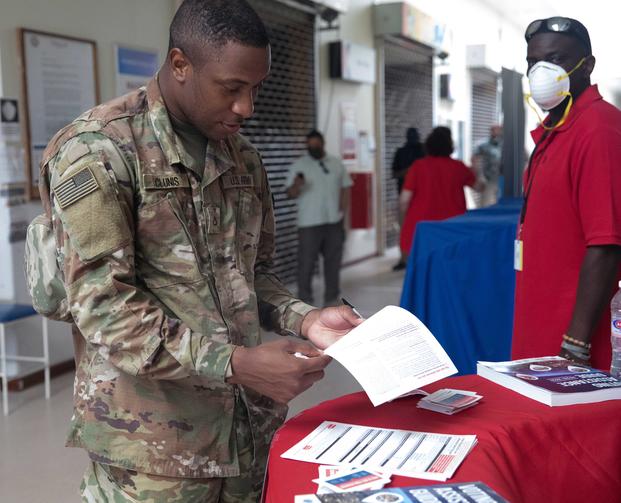As the outcome of the 2020 presidential election hangs on tight races in a few key states, the military vote could matter more than ever in deciding who will win the White House.
By Thursday morning, the race pitting President Donald Trump against former Vice President Joe Biden was undecided in Georgia, Pennsylvania, North Carolina, Arizona and Nevada.
Election experts say that U.S. service members voting absentee, as well as those voting where they are stationed, could make a difference. In 2016, more than 252,000 active-duty troops voted by absentee ballot; the U.S. Election Assistance Commission predicted that 2020 military absentee voting will be higher based on early numbers.
Read Next: Texas Air National Guard Member Dies of COVID-19
"There is no question about it, it's a tight race," Don Inbody, a retired Navy captain and former senior lecturer in the political science department at Texas State University, told Military.com. "A few votes here and a few votes [there] -- they add up and make a difference, particularly in a tight race. There were probably a lot of military votes going into North Carolina."
States have different guidelines for how long after Election Day they will accept absentee ballots. Arizona will accept ballots from service members that are received by Election Day, according to Jack Noland, research manager for Count Every Hero, a nonprofit, cross-partisan initiative formed this year with the goal of ensuring that every service member's right to vote is protected and their votes tallied.
Georgia accepts mailed ballots until Nov. 6. Pennsylvania and Nevada do so until Nov. 10, and North Carolina will until Nov. 12, Noland said.
Past elections have shown that military absentee ballots can be potentially decisive, he said, adding that in 2000, the overseas military vote swung the election in Florida.
"We know from the record that elections that are close can be decided by the ballots that are arriving latest ... and we also know, given the state of the race right now, we are in a position that we could very well see very, very tight races as we come down to the end of the count."
The majority of military absentee ballots went to Texas and Florida, which Trump claimed in this election, and to California, which went to Biden, said Inbody, author of the 2016 book "The Soldier Vote: War Politics and Ballot in America."
"The overall military vote is probably pretty evenly split -- maybe leaning slightly Republican," he said. "Officers, being largely white males, will vote overwhelmingly for Trump. Enlisted will split their vote fairly evenly. But still, the white personnel will tend to vote for Trump, while non-whites will tend to vote for Biden."
To Jeremy Teigen, professor of political science at Ramapo College of New Jersey, there is a perception that the "armed forces exhibit some kind of compelling conservative or Republican biases that have something to do with why people join the armed forces."
"But at the enlisted level, politics is substantially dwarfed by occupational concerns and the sense of doing something that is adventurous or trying to obtain GI Bill benefits," he said. "People are not enlisting in our armed forces because they are a particular political persuasion."
Teigen did say that the officer corps, made up of mostly white males, "does seem to attract, among males, a more conservative mindset."
Female service members, he said, "are more likely to be Democrat and vote for Joe Biden."
In August, a Military Times poll showed a decline in support for Trump among active-duty service members. Of the 1,018 active-duty troops surveyed in late July and early August, 49.9% had an "unfavorable view of the president, compared to about 38% who had a favorable view," Military Times reported.
Out of those officers surveyed, 59.1% had an unfavorable view of Trump; 35.1% had a favorable view of the president, Military Times reported.
Former senior leaders have pledged their support for both Biden and Trump. In September, Trump announced that 235 retired senior military officers had signed a letter backing him for reelection. But in October, Biden came out with his own list of 291 former generals, admirals, senior enlisted and national security officials who backed the former vice president.
However, Teigen maintains that there is a "Republican tilt to the veteran population that is not entirely explainable by their gender and their race but that is entirely powered by the male veteran population."
"Female veterans are politically indistinguishable from female nonveterans, whereas male veterans are slightly more Republican and were more likely to vote for Donald Trump in 2016," he said.
While the surge in military absentee voting may affect the election, there is also a chance that many votes may go uncounted because of postal delays and challenges to the system, Inbody said.
"The main thing about the military vote that I have seen ... is that it is exceedingly difficult for overseas personnel and their families to, one, get registered to vote and, two, get a marked ballot returned in time to be counted," he explained. "And the more the mail system is unable to support that, the more problems there will be with deployed military and overseas families."
-- Matthew Cox can be reached at matthew.cox@military.com.
Related: What First-Time Absentee Voters Can Learn from the Military











